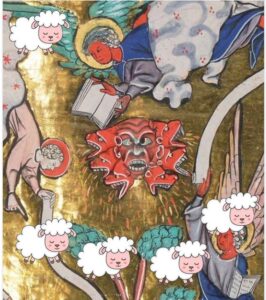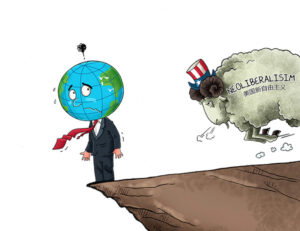 Samuel Butler published his novel Erewhon in 1872. The title is the (almost) reverse spelling of ‘Nowhere’ and it applies to a country the author discovered. He probably had in mind the Southern island of New Zealand where he minded sheep for a while.
Samuel Butler published his novel Erewhon in 1872. The title is the (almost) reverse spelling of ‘Nowhere’ and it applies to a country the author discovered. He probably had in mind the Southern island of New Zealand where he minded sheep for a while.
The protagonist, Higgs, tending sheep in a prairie, looks at a mountain in the distance and wonders what lies behind it. A native tells him that it is prohibited to visit that land. But inherent curiosity and the attraction of the forbidden prompt Higgs to attempt a visit.
After various treacherous obstacles he discovers a passage and finds himself in a beautiful rolling plain, where the air, nimbly and sweetly, recommends itself unto his gentle senses (1), whereupon he falls asleep. Continue reading

 Trump’s supporters, having found the vanity of conjecture and inefficacy of expectations, resolved to prove their own existence, if not by violence, at least by physical presence.
Trump’s supporters, having found the vanity of conjecture and inefficacy of expectations, resolved to prove their own existence, if not by violence, at least by physical presence. It now seems certain that we have a Joe Bidet for president. For if a rose by any other name would smell as sweet (1), a Biden, metaphorically speaking, by any other name still smells like a poorly maintained sanitary device, however many euphemisms the imagination may body forth out of the forms of things unknown. (2)
It now seems certain that we have a Joe Bidet for president. For if a rose by any other name would smell as sweet (1), a Biden, metaphorically speaking, by any other name still smells like a poorly maintained sanitary device, however many euphemisms the imagination may body forth out of the forms of things unknown. (2) During the cold war the West called dissenters those Russians in the USSR who voiced their complaints against the system. A definition – ‘dissenter’ – which, processed through the lexical grinding machine of the CIA and associates, was actually stripped of its original meaning to become a weapon of trivial instrumental imperialist propaganda. Said it another way, it was the dissenters who gave the pigs of the animal farm the tools for the pigs’ full spectrum propaganda.
During the cold war the West called dissenters those Russians in the USSR who voiced their complaints against the system. A definition – ‘dissenter’ – which, processed through the lexical grinding machine of the CIA and associates, was actually stripped of its original meaning to become a weapon of trivial instrumental imperialist propaganda. Said it another way, it was the dissenters who gave the pigs of the animal farm the tools for the pigs’ full spectrum propaganda. If flattery is the infantry of negotiations, then mendacity is the air force of politics. There are exceptions, but as a practical rule truth tellers are not deemed worthy of the public trust.
If flattery is the infantry of negotiations, then mendacity is the air force of politics. There are exceptions, but as a practical rule truth tellers are not deemed worthy of the public trust. It takes strength, endurance, resignation and stomach to like Donald Trump. Not for what he actually is. Under the pen of Alexandre Dumas, for example, Trump may even appear as a not-dislikable Yankee D’Artagnan of sorts. Maybe with less finesse than the original musketeer, whose contained yet French swaggering captivated millions of readers, when reading was still ‘cool’.
It takes strength, endurance, resignation and stomach to like Donald Trump. Not for what he actually is. Under the pen of Alexandre Dumas, for example, Trump may even appear as a not-dislikable Yankee D’Artagnan of sorts. Maybe with less finesse than the original musketeer, whose contained yet French swaggering captivated millions of readers, when reading was still ‘cool’. There is a history in all men’s lives (1), and in the history of their lives men often meet with mysteries, meaning events inexplicable via the resources of common sense and logic. Some mysteries are terrestrial, some metaphysic. Setting metaphysics aside, I’ll deal with the terrestrial.
There is a history in all men’s lives (1), and in the history of their lives men often meet with mysteries, meaning events inexplicable via the resources of common sense and logic. Some mysteries are terrestrial, some metaphysic. Setting metaphysics aside, I’ll deal with the terrestrial. Associating medicine with charlatanry smacks of ignorance and arrogance, two semantic relatives often found together. Perish the thought! But there is currently an exuberance of acknowledgment of a dubious medical pandemic, coupled with gross discrepancies in related statistics and fierce debates among disagreeing experts.
Associating medicine with charlatanry smacks of ignorance and arrogance, two semantic relatives often found together. Perish the thought! But there is currently an exuberance of acknowledgment of a dubious medical pandemic, coupled with gross discrepancies in related statistics and fierce debates among disagreeing experts. Sometimes ideas born out of an apparently sensible necessity evolve into something diabolically inevitable. On the other hand, the history of the formation of ideas is, or could be, what frees the mind from a blind search for explanations. For the alternative is to (dis)-content ourselves with effects without knowing their causes, other than attributing the faults of the system, for example, to the greed and covetousness of man. Which is as much as saying that a great cause of the night is lack of the sun (1) – or the equivalent of when medicine, unable to explain an illness or disease, says it is ‘genetic.’
Sometimes ideas born out of an apparently sensible necessity evolve into something diabolically inevitable. On the other hand, the history of the formation of ideas is, or could be, what frees the mind from a blind search for explanations. For the alternative is to (dis)-content ourselves with effects without knowing their causes, other than attributing the faults of the system, for example, to the greed and covetousness of man. Which is as much as saying that a great cause of the night is lack of the sun (1) – or the equivalent of when medicine, unable to explain an illness or disease, says it is ‘genetic.’  Whatever busies the mind without corrupting it has at least this use, that it rescues the day from idleness, and he that is never idle will not often be vicious.
Whatever busies the mind without corrupting it has at least this use, that it rescues the day from idleness, and he that is never idle will not often be vicious.